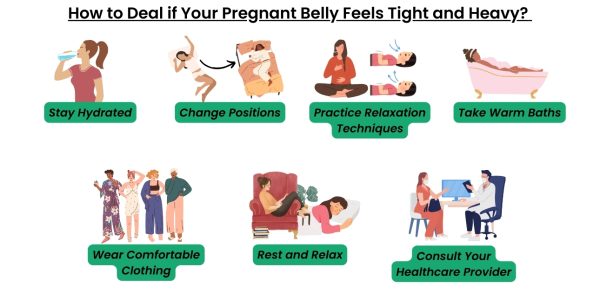Pregnancy brings a whirlwind of changes, and one of the most curious phenomena expectant mothers often experience is the fluctuating nature of their belly—sometimes feeling hard and at other times soft. This seemingly unpredictable change can cause a lot of worry and confusion. Imagine waking up to a firm, taut belly, only to feel it soften by midday. Is this normal?
According to healthcare experts, these variations are generally a natural part of pregnancy. But what exactly causes these changes, and when should you be concerned?
Understanding the underlying reasons can help ease your worries and ensure a healthier, more informed pregnancy journey.
How Does a Pregnant Belly Feel in Early Pregnancy?
In the early stages of pregnancy, many women are surprised to find that their belly doesn’t change much in size or firmness. During the first trimester, the uterus is still nestled deep within the pelvis, making physical changes less noticeable.
You might experience bloating and slight tenderness, often similar to the symptoms of a menstrual period. This is due to the increased production of hormones like progesterone, which slows down digestion and causes gas and bloating.
While your belly may not feel particularly hard or soft at this stage, these sensations are a normal part of early pregnancy. Healthcare providers assure that these early changes are just the beginning of your body’s incredible transformation.
Why is My Pregnant Belly Sometimes Hard and Sometimes Soft?
As your pregnancy progresses into the second and third trimesters, you might start noticing that your belly occasionally feels hard and at other times soft. This fluctuation is completely normal and is often attributed to Braxton-Hicks contractions. These sporadic, “practice” contractions are the result of your uterine muscles tightening and then relaxing.
While they can be surprising and sometimes uncomfortable, they are generally harmless. Braxton-Hicks contractions help prepare your body for labor, although they do not indicate that labor is imminent. Understanding the causes behind these changes can help you feel more at ease and know when to seek medical advice.
Understanding Braxton-Hicks Contractions
Braxton-Hicks contractions are essentially your body’s way of preparing for the real thing. These contractions can start as early as the second trimester, but they are more commonly felt in the third trimester.
Unlike true labor contractions, Braxton-Hicks are irregular, infrequent, and usually painless. They might feel like a tightening or hardening of the belly that lasts for about 30 seconds to two minutes before relaxing again.
Staying hydrated, changing positions, or taking a warm bath can often help alleviate these contractions.
Differentiating Between Braxton-Hicks and True Labor Contractions
It’s important to distinguish between Braxton-Hicks contractions and true labor contractions. True labor contractions become progressively stronger, more regular, and closer together. They are usually accompanied by other signs of labor, such as lower back pain, a bloody show, or the breaking of waters.
If you are ever in doubt, it is always best to consult with your healthcare provider to ensure everything is on track and to address any concerns you may have.
Other Causes of a Hard or Soft Belly During Pregnancy
Apart from Braxton-Hicks contractions, there are other reasons why your pregnant belly might feel hard or soft. A hard belly can also be due to the baby’s movements or positions. As your baby grows and changes position, you may feel areas of firmness or hardness in your abdomen.
On the other hand, a soft belly could simply be when your uterus and abdominal muscles are in a relaxed state. Digestive changes, such as bloating or constipation, can also contribute to the varying firmness of your belly. All these changes are typical as your body adapts to support your growing baby.
Stomach Tightening VS True Labor
Distinguishing between stomach tightening due to Braxton-Hicks contractions and true labor can be challenging for many expectant mothers. Understanding the differences is crucial for knowing when to seek medical attention.
While Braxton-Hicks contractions are irregular, infrequent, and typically painless, true labor contractions are consistent, increase in intensity, and are often accompanied by other signs of labor.
| Feature | Braxton-Hicks Contractions | True Labor Contractions |
|---|---|---|
| Regularity | Irregular | Regular and predictable |
| Frequency | Infrequent | Increase in frequency over time |
| Intensity | Generally mild and does not increase | Intensifies over time |
| Duration | Lasts about 30 seconds to 2 minutes | Lasts 30 to 90 seconds, increasing in duration |
| Pain Level | Usually painless or mildly uncomfortable | Painful, often starting in the back and moving to the front |
| Response to Movement | Often stop with movement or change in position | Continue regardless of movement or change in position |
| Associated Symptoms | Typically no other symptoms | May be accompanied by a bloody show, water breaking, or lower back pain |
How to Deal if Your Pregnant Belly Feels Tight and Heavy?
Feeling your belly tighten and grow heavy during pregnancy can be uncomfortable and sometimes worrisome. However, there are several strategies you can employ to alleviate these sensations and ensure you remain as comfortable as possible. Taking proactive steps can help manage these symptoms effectively, making your pregnancy experience more pleasant.
- Stay Hydrated: Drink plenty of water throughout the day to help prevent dehydration, which can trigger Braxton-Hicks contractions.
- Change Positions: Moving around or changing your position can often relieve the sensation of tightness and help ease discomfort.
- Practice Relaxation Techniques: Engage in deep breathing exercises, prenatal yoga, or meditation to relax your muscles and reduce tension.
- Take Warm Baths: Soaking in a warm bath can help soothe your muscles and alleviate the feeling of heaviness in your belly.
- Wear Comfortable Clothing: Opt for loose, comfortable clothing that does not constrict your abdomen, allowing your belly to expand naturally.
- Rest and Relax: Ensure you get adequate rest and avoid overexertion, as fatigue can exacerbate feelings of tightness and heaviness.
- Consult Your Healthcare Provider: If the sensations persist or are accompanied by other symptoms, seek advice from your healthcare provider to rule out any complications.
Bottom Line
Variations in belly firmness, often due to Braxton-Hicks contractions, are a normal part of pregnancy as your body prepares for labor. By staying informed and using simple strategies to manage discomfort, you can enjoy a healthier, more comfortable pregnancy. Always consult with your healthcare provider if you have any concerns about your pregnant belly feeling hard and soft, ensuring the best care for you and your baby.
Question 1: Is a hard pregnancy belly normal?
Ans: A hard pregnancy belly is normal and is often due to Braxton-Hicks contractions or the baby’s movements. These “practice” contractions help prepare your body for labor and can make your belly feel temporarily firm. However, if you experience persistent pain or other unusual symptoms, it’s important to consult with your healthcare provider.
Question 2: Is it OK to have a soft stomach?
Ans: Having a soft stomach during pregnancy is also normal. Your belly may feel soft when the uterus and abdominal muscles are relaxed. Changes in your baby’s position, as well as fluctuations in digestion, can also affect the firmness of your belly. Both hard and soft sensations are typical as your body adapts to pregnancy.
Question 3: Does fat get softer when losing weight?
Ans: When losing weight, fat may initially feel softer before it is reduced. As your body starts to break down fat cells, the fat can feel looser or softer. This process is a natural part of weight loss and indicates that your body is metabolizing stored fat.


